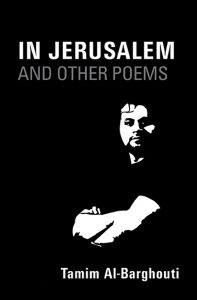By:Tamim Al-Barghouti
Interlink Publishers, May 2017, Paperback, 128 pages, US$ 15
…………………
 This is the long-awaited first English translation of poems by the celebrated Palestinian poet, columnist, and political scientist Tamim Al-Barghouti. Born in 1977, he is probably one of the most widely read Palestinian poets of his generation. His poetry readings are attended by thousands, sometimes packing stadiums and amphitheaters. The reception of his poetry among a diverse audience from various backgrounds and age groups is a testimony to the vitality of the centuries-old tradition of classical Arabic poetry. The poems in this collection were written in Cairo, Ramallah, Amman, Washington, DC, and Berlin between 1996 and 2016.
This is the long-awaited first English translation of poems by the celebrated Palestinian poet, columnist, and political scientist Tamim Al-Barghouti. Born in 1977, he is probably one of the most widely read Palestinian poets of his generation. His poetry readings are attended by thousands, sometimes packing stadiums and amphitheaters. The reception of his poetry among a diverse audience from various backgrounds and age groups is a testimony to the vitality of the centuries-old tradition of classical Arabic poetry. The poems in this collection were written in Cairo, Ramallah, Amman, Washington, DC, and Berlin between 1996 and 2016.
In 2007, Al-Barghouti’s long poem “In Jerusalem,” describing an aborted journey to the ancient city, became something of a street poem. Palestinian newspapers dubbed Al-Barghouti “The Poet of Jerusalem.” To this day, his posters hang on the streets of Jerusalem and other Palestinian cities, and key chains with his picture are sold. Sections of the poem have even become ring-tones blaring out from cell phones across the Arab world, and children compete in memorizing and reciting it. “In Jerusalem” and other poems read by Al-Barghouti have been aired on various TV channels and are widely viewed on the Internet, winning the poet an exceptional celebrity status in the Arab world. In 2011, Barghouti won the prize “Prince of Poets” in a TV competition.
On January 26, 2011, the day after the outbreak of protests that would lead to the Egyptian Revolution and topple President Hosni Mubarak, Al-Barghouti wrote the lyrical poem “Hanet” whose title roughly translates to “It’s Close.” With the Internet down, he faxed the poem to a Cairo newspaper, copies of which were distributed in Tahrir Square. Soon after, Al-Jazeera TV broadcast a recording of it and a video of his reading was projected in the square every couple of hours on makeshift screens.
Tamim Al-Barghouti has published six poetry collections in both colloquial and classical Arabic, Meejana (1999), Al-Manzar (The Scene, 2000), Maqam Iraq (2005), Fil Quds (In Jersualem, 2008), and Ya Masr Hanet (2012), and two academic books on Arab politics and history. He received his PhD in political science from Boston University in 2004 and has since taught at Georgetown University in Washington, DC, the Free University in Berlin, and the American University in Cairo. He was a fellow at the Berlin Institute for Advanced Studies from 2007–2008. A columnist since 2003, writing in Egyptian and Lebanese dailies, Al-Barghouti has been associated with the 2011 uprisings and with political activism in Egypt and Palestine. He is currently based in Beirut and works at the United Nations Economic and Social Commission for West Asia.
Praise for Tamim Al-Barghouti: He has “established himself as a master of Arabic language and history – an achievement unmatched in his generation of literati.” (Al Ahram Weekly). Poet, scholar, and translator Sharif S. Elmusa has commented, “Whether lyrical, narrative, or allegorical, whether about the chess game or Jerusalem, these poems continually surprise us with their images, insights, and juxtapositions. The poet scoops up the everyday and hitches the freight to a broader social and historical memory. Al-Barghouti’s is an educated imagination.”

